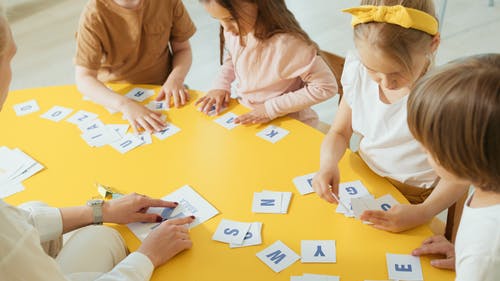
Kids commonly start mendacity inside the preschool years, between 2 and 4 years of age. Those intentional attempts at deception may also fear mother and father, who fear their toddler becomes a pint-sized social deviant. However from a developmental perspective, mendacity in younger kids is hardly ever purpose for subject.
In truth, lying is often one of the first symptoms a young baby has advanced a “principle of mind”, which is the awareness others can also have distinctive goals, emotions, and ideals approximately themselves. When a baby misleadingly claims “daddy said i may want to have an ice cream”, they’re the use of this consciousness of others’ minds to plant false information. Whilst lying itself won't be socially perfect, the ability to know what others are thinking and feeling is an critical social talent. It’s associated with empathy, cooperation, and care for others once they’re feeling upset. How lying changes with age.
young kids’s first lies are often extra funny than effective.
Consider the kid who claims no longer to have eaten any cake while her mouth remains full, or who blames the family canine for drawing at the wall. Young youngsters may additionally understand they can deceive others, but they don’t yet have the sophistication to do so well. Earlier than age eight, kids regularly provide themselves away whilst lying. In a single study, youngsters elderly 3 to seven were requested now not to peek at a mystery toy (barney) that had been located at the back of them.
Nearly all did, and nearly all lied about it later (increasing with age). But across the organization, kids additionally had problem retaining the lie. Liars aged 3 to 5 had been exceedingly appropriate at retaining a instantly face but normally gave themselves away via describing the barney toy via call. Liars aged six and 7 had blended fulfillment, with 1/2 feigning lack of information and half by accident announcing barney’s name.
As children become older and their perspective-taking capability develops, they’re increasingly more capable of apprehend the kinds of lies on the way to be plausible to others. They also become higher at keeping the lie over the years. Moral development additionally kicks in. More youthful kids are much more likely to lie for personal gain, even as older youngsters more and more expect feeling bad about themselves in the event that they lie. Older youngsters and teens are also more likely to draw differences among exclusive kinds of lies. White lies, to them, are considered greater suitable than dangerous or antisocial lies. Even as studies that estimate the frequency of lying amongst kids and teens are rare, teenagers are specially probably to deceive mother and father and instructors approximately matters they recollect their own private enterprise. One observe found eighty two% people teens said mendacity to their dad and mom about cash, alcohol, pills, buddies, courting, parties, or sex within the beyond year.
They have been maximum probable to lie approximately their friends (sixty seven%) and alcohol/drug use (sixty five%). Perhaps fantastically, they had been least in all likelihood to lie approximately intercourse (32%). While reading brief eventualities in which the protagonist lied to his or her dad and mom, the teenagers had been also probably to remember the lying perfect if it turned into to assist somebody or hold a personal secret, but no longer if it changed into to damage or harm a person. Is lying a cause for problem? Notwithstanding its occurrence, lying among youngsters is rarely cause for concern. It’s crucial to don't forget many adults also lie – once in a while for true, as inside the case of white lies that defend someone’s emotions, and now and again for unwell. Whilst estimates vary, a examine determined approximately 40% of us adults suggested telling a lie within the past 24 hours.
In some instances, chronic lying can emerge as a difficulty in the event that they occur along a cluster of other behaviours which might be maladaptive. As an example, deceitfulness through lying is often found in behavior and oppositional defiant issues (odd). Young human beings with conduct disorders or extraordinary purpose vast disruptions in the home or at faculty through chronic aggression and damage to others or assets. But to satisfy diagnoses, lying would must arise with a cluster of other signs and symptoms along with refusal to conform with authority figures, continual violations of rules, and failure to take duty for his or her actions.
Every other reason for parental difficulty is that if mendacity serves to mask other mental fitness problems due to worry or shame. For instance, a infant or adolescent tormented by excessive anxiety might also lie chronically to keep away from confronting conditions that cause them to afraid (for instance, college, parties, germs). They will also misinform keep away from the stigma of mental health issues. In these times, consulting your health practitioner or a intellectual fitness professional (inclusive of a psychologist or psychiatrist) will help clarify whether or not lying is indicative of a intellectual fitness situation.
Mother and father and teachers make a difference
while lying is developmentally normal, dad and mom and teachers can support children’s fact-telling in three ways. First, keep away from excessive or over-the-top punishments. In a have a look at evaluating a west african faculty that used punitive punishments (including hitting with a stick, slapping, and pinching) and a school that used non-punitive reprimands (such as time outs or scolding), college students at the faculty with punitive punishments had been much more likely to be powerful liars. Youngsters from households that location a strong emphasis on following the regulations and no longer open talk additionally record mendacity greater often. By identifying whether or not your infant is making an attempt to lie to you on motive, you may goal your reaction more successfully.
second, talk emotional and moral situations with youngsters. This “emotion training” supports kids’s understanding of whilst lies are maximum dangerous, how they have an effect on others, and the way they themselves would possibly feel after they lie. Youngsters increasingly expect pride in telling the fact, and dad and mom can emphasize those fantastic components of reality-telling. 1/3, make sure the lie simply is a lie. Very younger youngsters are at risk of combination actual existence and creativeness, while older youngsters and adults frequently remember arguments differently from each other. If a infant reports bodily or sexual abuse, these allegations should constantly be investigated.
By way of distinguishing whether or not or no longer there's a planned attempt at deception, parents and instructors can goal their response efficaciously. Lying in youngsters is developmentally everyday lying is developmentally regular and an important sign different cognitive capabilities also are growing. If lying is persistent and is impairing the child’s potential to characteristic efficaciously in ordinary lifestyles, it’s worth consulting a mental health expert or your doctor. But in other situations, keep in mind that lying is simply one-manner children discover ways to navigate the social international. Open and warm discussions approximately telling the truth ought to sooner or later assist to reduce children’s lies as they expand.

 المملكة العربية السعودية
المملكة العربية السعودية البحرين
البحرين الإمارات العربية المتحدة
الإمارات العربية المتحدة قطر
قطر الأردن
الأردن مصر
مصر تركيا
تركيا جنوب أفريقيا
جنوب أفريقيا




(0) التعليقات